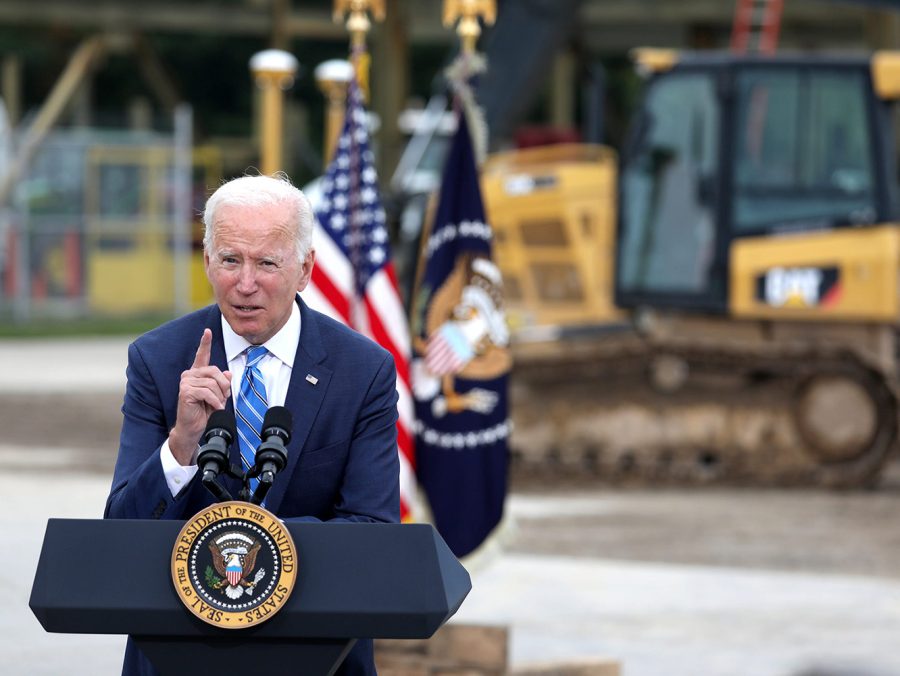Opinion | How Iowa benefits from infrastructure investments
The Infrastructure Investment and Jobs Act will effectuate necessary infrastructure improvements in Iowa.
Eric Seals / USA TODAY NETWORK
President Biden speaks to workers and elected officials at the International Union of Operating Engineers Local 324 in Howell, Michigan on October 5, 2021. Biden talked about the bipartisan infrastructure bill and his Build Back Better plan.
November 15, 2021
The Infrastructure Investment and Jobs Act is a major win for the Biden Administration and Americans across the country. The package boasts major infrastructure investments, and it will generate major improvements in transportation, climate, water, and internet in the state of Iowa.
Passed in a bipartisan fashion by both chambers of Congress and signed by President Joe Biden, the hotly contested and highly anticipated infrastructure bill is now law. After individual state allotments, Iowa stands to gain over $5 billion in upgraded infrastructure.
The American Society of Civil Engineers gave Iowa a “C,” grade on its 2019 report card, meaning there’s much to be improved upon statewide. Among Iowa’s delegation, Rep. Cindy Axne and Sen. Chuck Grassley supported the legislation. Both members of Congress agree the bill is a major investment in Iowa’s future.
The bulk of investments in Iowa are directed toward improving methods of transportation. First, Iowa is a nationwide leader in structurally deficient bridges, and more than 60 percent of Iowa’s bridges are in fair or poor condition. From the infrastructure deal, Iowa is expected to gain $432 million for repairs, potentially improving thousands of bridges.
More than 400 miles of highway in Iowa are considered “poor condition.” $3.4 billion will go toward fixing Iowa’s roads, which is the largest amount specifically appropriated for any infrastructure issue in the state. Despite the inconvenience of road work during the summer months, these improvements will cut down on automotive costs for drivers in Iowa.
As for means of transportation, Iowa airports will receive $120 million over five years to facilitate infrastructure upgrades. The state has many small and midsize airports in dire need of improvements, and the infrastructure bill will make an enormous difference.
Intersecting means of transportation and climate agendas, the bill also allocates funds for electric vehicle infrastructure. Iowa will receive $51 million over 5 years to expand electric vehicle charging options.
Improving and encouraging public transportation is another climate investment, and $305 million will be used to improve public transit options in Iowa. The emphasis on sustainability in transportation is critical now and will continue to be in the future.
Furthering climate goals, Iowa will benefit from a national investment to improve home energy efficiency, and the state will receive $15 million for wildfire protection.
Aside from transportation and climate investments, the bill seeks to remove lead service pipes to improve water quality. The bill’s provisions will provide Iowa with $638 million to upgrade infrastructure and ensure our water is safe.
Finally, it’s vital for Americans to have access to the internet now, more than ever. In Iowa, 16 percent of households do not have internet access, but the bill provides a minimum of 100 million to expand broadband access in Iowa. In addition, Iowa will receive $15 million to protect against cyberattacks, which is an issue that has significantly affected Iowans recently.
The benefits of this bill, for both Iowans and residents of other states alike, cannot be understated. Some politicians characterize this bill as unnecessary spending, and other members of Congress wanted more funding included. However, the reality is that the bill ensures various long-term investments that will facilitate necessary infrastructure upgrades.
Columns reflect the opinions of the authors and are not necessarily those of the Editorial Board, The Daily Iowan, or other organizations in which the author may be involved.



